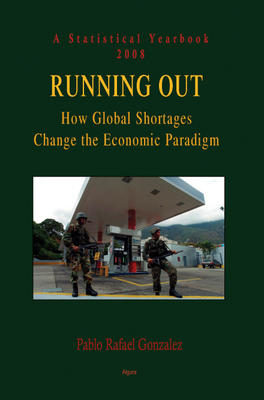
Sound Bite
The numbers speak for themselves. A disastrous worldwide trend over the last 100 years is illustrated in tables, graphs and analyses of natural resource reserves vs. production and consumption. The effects of world income distribution, objective limits to economic growth on a finite planet, the impossibility of providing full employment on a global scale and the role allotted to the Third World are laid out in black on white. Updated tables and a new, compact format bring this volume of essential statistics to today's increasingly tense debate. The figures add up to an urgent call for a global commitment to alternative energies and conservation measures.
About the Author
Pablo Rafael Gonzalez founded and was Director of the Political Analysis Office of the Venezuela Senate and served as Information Director of the Central Office of Coordination and Planning of the Republic Presidency. As a researcher with a wide experience in the political sciences, economy and philosophy, his principal interest has been in themes as employment and economic growth, external debt, globalization, energy and natural resources. Gonzalez has served as Assistant of the Congress President (1993); Executive secretary of the Parliamentary East Block (1990-1992); Counsellor of the Congress Presidency (1989); Counsellor of the Energy and Mines Senate Committee (1984-1988); Counsellor of the Deputies Chamber (1981-1983); Information Director of the Central Office of Coordination and Planning of the Republic Presidency, Cordiplan. Planning Ministry. (1974-1978). Gonzalez is a professional journalist. A member of the Venezuelan Journalist College, his column “Current Affairs” appeared regularly in the Caracas daily, April.
|
|
About the Book
The shocking implications of a worldwide scarcity of natural resources have suddenly started to come clear. Higher prices for gas and heating oil may be a mere inconvenience, so far; occasional brown-outs and water shortages can be brushed off as...
The shocking implications of a worldwide scarcity of natural resources have suddenly started to come clear. Higher prices for gas and heating oil may be a mere inconvenience, so far; occasional brown-outs and water shortages can be brushed off as seasonal or regional problems ' but only up to a point. These are quickly evolving into major, prolonged and widespread shortages of the most elementary commodities, and food riots have already sprung up. The crisis is being accelerated by mankind's heedless overexploitation and contamination of what's left. Pablo Rafael Gonzalez documents the dire state of the earth's reserves of oil, water and food, and the rapid extinction of plant and animal species, in 150 tables and graphs drawn largely from World Bank and UN reports. Gonzalez, a political analyst, has advised Venezuela's President and Congress for 25 years on energy and resource issues. In this book he convincingly demonstrates that we are well on the way to exhausting both renewable and nonrenewable natural resources, even if we are in denial about it. This is an unprecedented and mind-boggling challenge for humanity. It also signals a change of the economic paradigm, the lens through which economic experts view the world. Capital, economists like to say, is the scarce factor of production; but starting in this century, it's the scarcity of natural resources that will limit growth. It's time we recognized that fact and dealt with it. Until now, it has been relatively easy to keep on expanding production as mankind conquered the globe, continually gaining access to rich 'new'Â lands; and rapid population growth has meant there were generally enough hands to do the work. That halcyon era is coming to an end, and economists will have to shift their focus from problems of distribution to problems of resources. The evidence presented in these pages adds up to an urgent plea that governments and other policy-makers abandon some traditional economic ideas and invent radically new approaches in order to shape responsible policies. The updated tables and graphs make this book invaluable to students and professionals in the fields of history, political science, economics and environmental studies, as well as those involved in or preparing for careers in the geological and extractive industries. Natural resource reserves, production and consumption around the world over the last 100 years, and reductions in forested land, animals and plant species are also tabulated.
|
|
Pages 196
Year: 2008
LC Classification: HC59.3.G66 2005
Dewey code: 333.8'2'dc22
BISAC: REF027000
BISAC: BUS023000
Soft Cover
ISBN: 978-0-87586-512-6
Price: USD 23.95
Hard Cover
ISBN: 978-0-87586-513-3
Price: USD 38.95
eBook
ISBN: 978-0-87586-514-0
Price: USD 23.95
|













